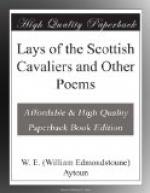Most of the old officers, who had been trained in the foreign wars, were of the former opinion—“alleging that it was neither prudent nor cautious to risk an engagement against an army of disciplined men, that exceeded theirs in numbers by more than a half.” But both Glengarry and Locheill, to the great satisfaction of the General, maintained the contrary view, and argued that neither hunger nor fatigue were so likely to depress the Highlanders, as a retreat when the enemy was in view. The account of the discussion is so interesting, and so characteristic of Dundee, that I shall take leave to quote its termination in the words of Drummond of Balhaldy:
“An advice so hardy and resolute could not miss to please the generous Dundee. His looks seemed to heighten with an air of delight and satisfaction all the while Locheill was speaking. He told his council that they had heard his sentiments from the mouth of a person who had formed his judgment upon infallible proofs drawn from a long experience, and an intimate acquaintance with the persons and subject he spoke of. Not one in the company offering to contradict their general, it was unanimously agreed to fight.
“When the news of this vigorous resolution spread through the army, nothing was heard but acclamations of joy, which exceedingly pleased their gallant general; but before the council broke up, Locheill begged to be heard for a few words. ‘My Lord’ said he, ’I have just now declared, in the presence of this honourable company, that I was resolved to give an implicit obedience to all your Lordship’s




